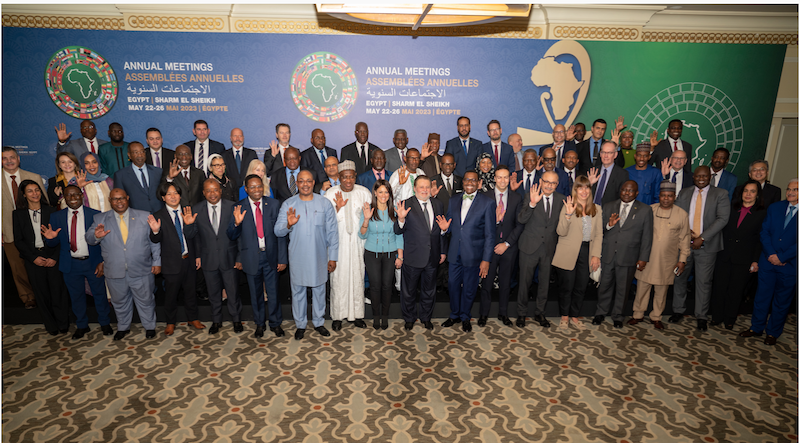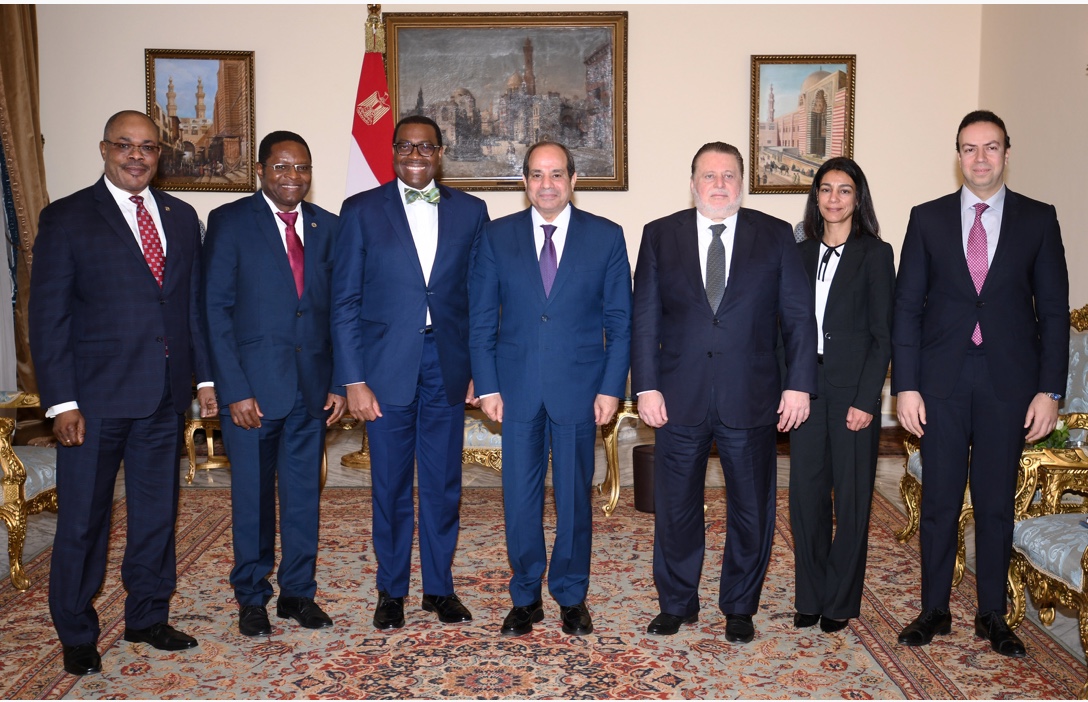Egyptian President Abdel Fattah Al-Sisi on April 4 hailed the work the African Development Bank Group is doing to help the continent cope with the impact of global economic challenges.
The Egyptian leader received, in Cairo, the President of the African Development Bank Group, Akinwumi Adesina who was accompanied by the Chief Economist and Vice President of the bank in charge of Economic Governance and Knowledge Management, Kevin Urama, and the general secretary, Vincent Nmehielle.
The Governor of the Central Bank of Egypt, Hassan Abdallah, the Deputy Governor for Monetary Stability, Rami Aboul Naga and the Deputy Governor for External Affairs, Farid Mannullah, were also present.
Akinwumi Adesina traveled to Egypt to learn about preparations for the Bank Group’s 2023 Annual Meetings, which are being held from May 22 to 26 in the seaside resort of Sharm el-Sheikh. Alongside governors, directors, development partners and bank management, no less than 13 heads of state and government are expected to attend these meetings to discuss the mobilization of private sector financing for the climate and green growth in Africa.
Egypt looks forward to continuing and strengthening its cooperation with the bank in various development sectors, President Al-Sisi said.
The bank is working closely with Egypt to mobilize international climate finance to address the country’s climate challenges, build the resilience of vulnerable systems and promote sustainable development. The Just Green Transition initiative has a pipeline of projects representing US$14.8 billion in investments, to tackle the indissoluble links between water, food and climate. ‘energy.
The African Development Bank is responsible for leading the mobilization of financing for projects under the “ water ” pillar. “The bank raised $2.3 billion, exceeding the initial target of $1.4 billion,” said Akinwumi Adesina.
The bank also supports water desalination projects in the country.
The President of the African Development Bank Group hailed Egypt’s vigorous efforts to leverage private sector financing for green growth initiatives. Egypt is very vulnerable to climate change, due to a predominantly arid topography.
The Egyptian government plans to issue a green bond in Chinese capital markets by the end of June 2023. The “Green Panda” bond, with a face value of $500 million, will be issued in chinese renminbi.
“This is the first time that an African country will issue a bond on the Chinese capital markets,” said Akinwumi Adesina.
The bank’s board is due to consider Egypt’s request for a $345 million partial credit guarantee to back its bond issuance in the coming months.
The “Green Panda” bond is the latest in a series of bonds that Egypt has issued since 2020, when it launched its green finance framework.
Akinwumi Adesina also hailed Egypt’s commitment to increasing the role of the private sector in the economy.
Earlier this year, Egypt launched the privatization of 32 public entities, which are expected to bring in $40 billion over the next four years to reduce the public sector’s footprint in the economy and give more space to the private sector growth.
In terms of new financial support for 2023, the bank should allocate additional support of $133 million to Egypt to deal with the macroeconomic instability caused by the persistence of the multifaceted global crisis. Last year, the bank gave it budget support of $272 million.

Quality infrastructure
The bank’s president met on Wednesday with the Governor of South Sinai Governorate, Major General Khaled Fouda, who said the city of Sharm el-Sheikh was ready to welcome the more than 2,000 participants expected at the Annual Meetings. of the bank, in May.
Akinwumi Adesina said the infrastructure and facilities the Egyptian government has put in place in Sharm el-Sheikh, which successfully hosted COP27 last year, made a big impression.
“The infrastructure you have developed in Sharm el-Sheikh is amazing. The city is constantly evolving and places green growth at the heart of its development. It is an example of how successful financing of municipalities and other sub-national entities can impact socio-economic development, Akinwumi Adesina said. Other African countries can learn from Sharm el-Sheikh. »
Akinwumi Adesina also met with diplomats representing shareholder countries and the bank’s development partners in Cairo. He reiterated the bank’s commitment to support African countries for accelerated development, despite the impacts of numerous economic shocks and geopolitical tensions.
“We live in a very complex world. Also, our role as the African Development Bank is to help accelerate the development of African countries and we are there to help African countries cope with the series of shocks, whether climate, debt, to recover from the Covid-19 pandemic, or to invest in what they need for the structural transformation of their economies“, reaffirmed Akinwumi Adesina.
Present at the meeting were Egyptian Minister for International Cooperation Rania Al-Mashat; Undersecretary for Regional Economic Organizations Ebtisam Rakha; the acting Governor of the Egyptian Central Bank, Hassan Abdallah – also Governor of the African Development Bank for Egypt –; the Cameroonian ambassador and dean of the African diplomatic corps in Egypt, Mohamadou Labarang, as well as one of the directors of the bank, Nomoto Takaaki.
Source: African Development Bank Group (AfDB)








Réagissez à cet article